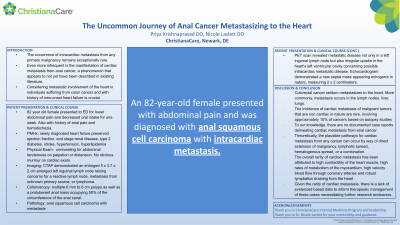Sunday Poster Session
Category: Colon
P0354 - The Uncommon Journey of Anal Cancer Metastasizing to the Heart
Sunday, October 27, 2024
3:30 PM - 7:00 PM ET
Location: Exhibit Hall E

Has Audio

Priya Krishnaprasad, DO
Christiana Care Health Services
Newark, DE
Presenting Author(s)
Priya Krishnaprasad, DO1, Nicole Laslett, DO2
1Christiana Care Health Services, Newark, DE; 2Christiana Care Health System, Newark, DE
Introduction: Historically, anal squamous cell cancer is rare but incidence has been rising. Moreover, the occurrence of intracardiac metastasis from anal squamous cell cancer is a phenomenon that appears to not be described in existing literature. Considering metastatic involvement of the heart in individuals suffering from anal cancer and with history of new-onset heart failure is crucial.
Case Description/Methods: An 82-year-old female with newly diagnosed heart failure with preserved ejection fraction, end stage renal disease, type 2 diabetes, and stroke presented to the emergency department for lower abdominal pain and poor oral intake for one week without associated fevers, chills, vomiting, or diarrhea. Physical examination was unrevealing for abdominal distention or tenderness.
CT imaging demonstrated an enlarged 5 x 3.7 x 2 cm enlarged left inguinal lymph node raising concerns for a reactive lymph node, metastasis from unknown primary source, or lymphoma. Patient endorsed anal pain and hematochezia and underwent a colonoscopy showing many 6 mm to 6 cm polyps and a protuberant anal mass occupying 50% of the circumference of the anal canal. Pathology results showed anal squamous cell carcinoma with metastasis and strong p16 positivity. PET scan revealed metastatic disease not only in a left inguinal lymph node but also irregular uptake in the heart's left ventricular cavity concerning for intracardiac metastatic disease. Echocardiogram demonstrated a new septal mass that appeared echogenic in nature, measuring 2 x 2 centimeters. This patient ultimately opted for chemotherapy and radiation treatment with curative intent.
Discussion: This case underscores the exceedingly rare occurrence of intracardiac metastasis stemming primarily from primary anal cancer. Anal squamous cell cancer is an aggressive malignancy and typically precipitated by prior human papillomavirus infection. Anal cancer incidence has been increasing by 2.7% every year in the US and mortality increasing by 3% annually. To our knowledge, there are no documented case reports delineating cardiac metastasis from anal squamous cell cancer, suggesting the aggressiveness of this form of cancer. Theoretically, the plausible pathways for cardiac metastasis may occur through direct extension of malignancy, lymphatic spread, hematogenous spread, or a combination. Given the rarity of cardiac metastasis, there is a lack of evidenced based data to inform therapeutic management of these cases necessitating further research endeavors.
Disclosures:
Priya Krishnaprasad, DO1, Nicole Laslett, DO2. P0354 - The Uncommon Journey of Anal Cancer Metastasizing to the Heart, ACG 2024 Annual Scientific Meeting Abstracts. Philadelphia, PA: American College of Gastroenterology.
1Christiana Care Health Services, Newark, DE; 2Christiana Care Health System, Newark, DE
Introduction: Historically, anal squamous cell cancer is rare but incidence has been rising. Moreover, the occurrence of intracardiac metastasis from anal squamous cell cancer is a phenomenon that appears to not be described in existing literature. Considering metastatic involvement of the heart in individuals suffering from anal cancer and with history of new-onset heart failure is crucial.
Case Description/Methods: An 82-year-old female with newly diagnosed heart failure with preserved ejection fraction, end stage renal disease, type 2 diabetes, and stroke presented to the emergency department for lower abdominal pain and poor oral intake for one week without associated fevers, chills, vomiting, or diarrhea. Physical examination was unrevealing for abdominal distention or tenderness.
CT imaging demonstrated an enlarged 5 x 3.7 x 2 cm enlarged left inguinal lymph node raising concerns for a reactive lymph node, metastasis from unknown primary source, or lymphoma. Patient endorsed anal pain and hematochezia and underwent a colonoscopy showing many 6 mm to 6 cm polyps and a protuberant anal mass occupying 50% of the circumference of the anal canal. Pathology results showed anal squamous cell carcinoma with metastasis and strong p16 positivity. PET scan revealed metastatic disease not only in a left inguinal lymph node but also irregular uptake in the heart's left ventricular cavity concerning for intracardiac metastatic disease. Echocardiogram demonstrated a new septal mass that appeared echogenic in nature, measuring 2 x 2 centimeters. This patient ultimately opted for chemotherapy and radiation treatment with curative intent.
Discussion: This case underscores the exceedingly rare occurrence of intracardiac metastasis stemming primarily from primary anal cancer. Anal squamous cell cancer is an aggressive malignancy and typically precipitated by prior human papillomavirus infection. Anal cancer incidence has been increasing by 2.7% every year in the US and mortality increasing by 3% annually. To our knowledge, there are no documented case reports delineating cardiac metastasis from anal squamous cell cancer, suggesting the aggressiveness of this form of cancer. Theoretically, the plausible pathways for cardiac metastasis may occur through direct extension of malignancy, lymphatic spread, hematogenous spread, or a combination. Given the rarity of cardiac metastasis, there is a lack of evidenced based data to inform therapeutic management of these cases necessitating further research endeavors.
Disclosures:
Priya Krishnaprasad indicated no relevant financial relationships.
Nicole Laslett indicated no relevant financial relationships.
Priya Krishnaprasad, DO1, Nicole Laslett, DO2. P0354 - The Uncommon Journey of Anal Cancer Metastasizing to the Heart, ACG 2024 Annual Scientific Meeting Abstracts. Philadelphia, PA: American College of Gastroenterology.
